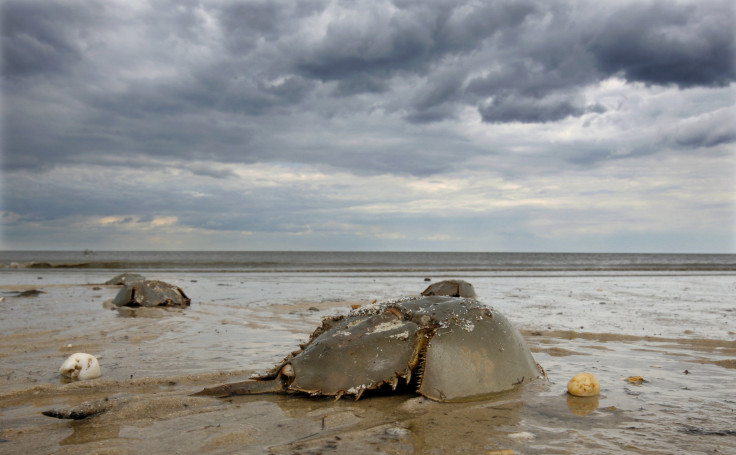Why Are Horseshoe Crabs Dying In Japan? 'Living Fossil' Crabs Are Mysteriously Dead

Hundreds of horseshoe crabs are washing up dead in Japan and nobody can figure out why.
Typically some 50 crabs died on the coast of Kitakyushu, Japan, the largest habitat for the country's horseshoe crab. This year, nearly 500 have washed ashore, Quartz reported Wednesday. That's the largest such figure in two decades, according to the Asahi Shimbun newspaper.
It could be a whole mix of factors causing the deaths. "Rises in the sea level caused by global warming, shortages of places to lay eggs and a lack of nutrition could have resulted in their deaths," Hiroko Koike, a researcher at the Kyushu University Museum, told Asahi Shimbun. "We have to be careful to identify the cause."
The horseshoe crab has survived the last five mass extinctions, but now it’s mysteriously dying https://t.co/3kP5TeBIQl
— Quartz (@qz) September 15, 2016
The number of dead crabs started increasing in June and accelerated into July and August, with reports of up to 10 crabs washing up in a day. Shungo Takahashi, who heads the local branch of a group that observes and protects the species, estimated to Asahi Shimbun that there were about 2,400 horseshoe crabs in the Sonehigata tidal flat habitat off of Kitakyushu. The death of about 500 would represent a 20 percent decline in population. A major concern is that the crabs won't lay as many eggs this year, leading to further issues for the endangered species.
Horseshoe crabs have been washing ashore in India as well, possibly facing extinction in two areas, which researchers said could be the result of habitat destruction.
Horseshoe crabs are often called "living fossils" because they're prehistoric creatures that still look fairly similar to how they looked in the fossil record. They're resilient as well, living through five mass extinctions , the deadliest of which killed some 95 percent of marine species, Quartz pointed out. The word "crab" might not be the best name for the creatures, however, since they're actually closer relatives to spiders and scorpions (which means they're quite large, horseshoe sea scorpions, a fact that is in no way disturbing). They also have incredibly valuable blue blood that is used for medical tests and sells for $15,000 per liter, according to the BBC.
© Copyright IBTimes 2024. All rights reserved.






















